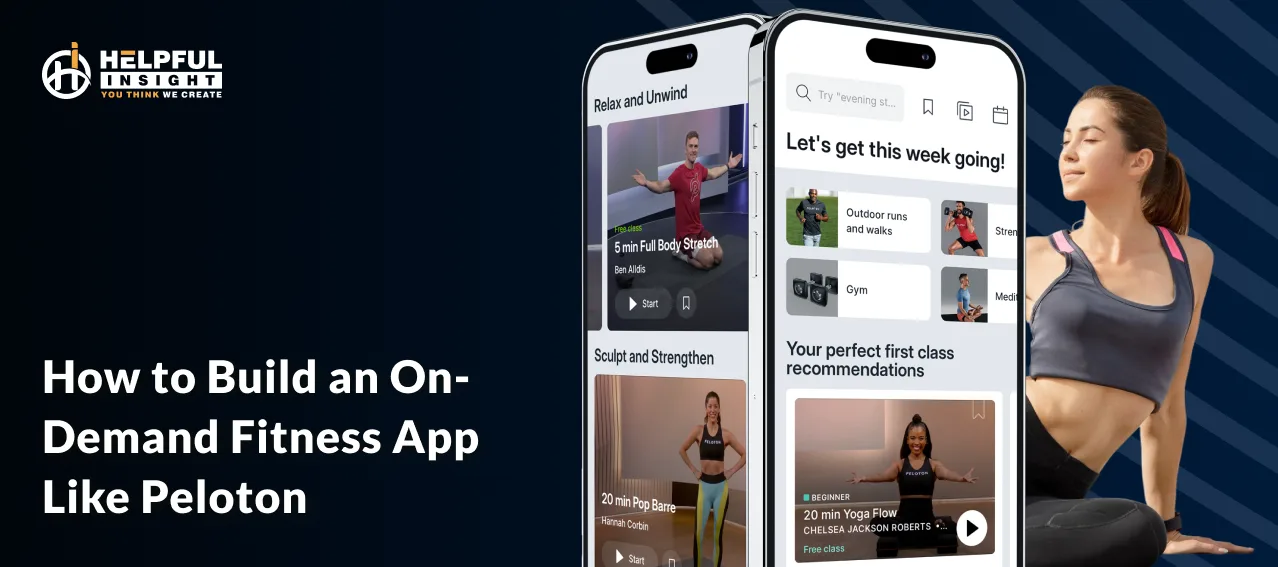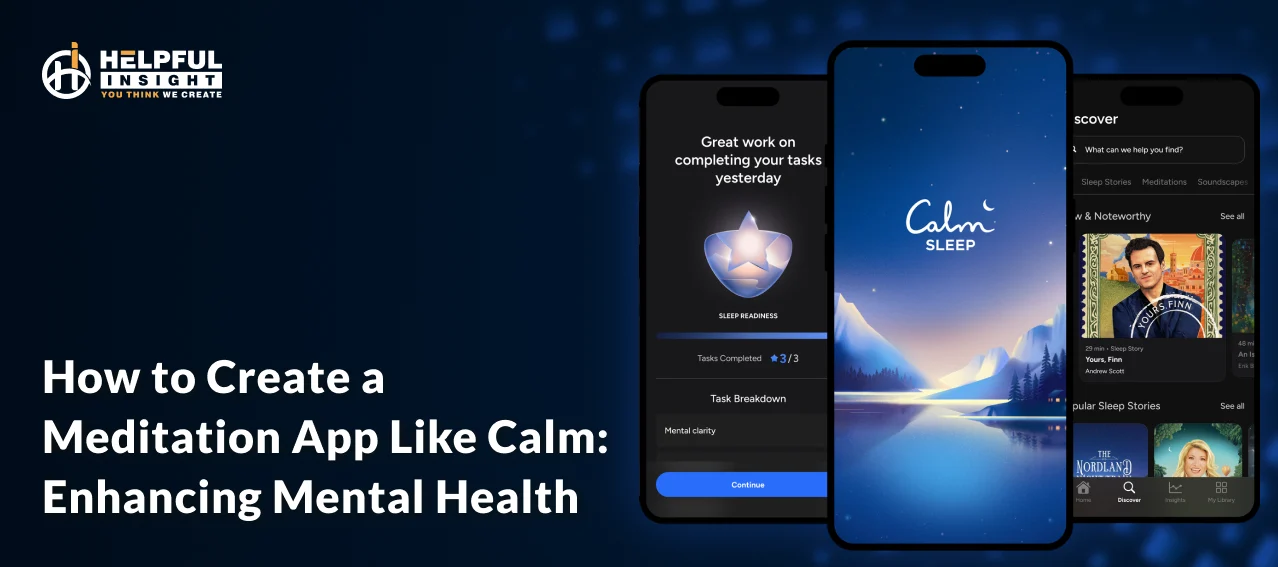The combination of AI and sports is changing how players train, teams compete, and fans enjoy their favorite sports. AI in sports is not just a technology; it is the most important part of strategy, performance, and business.
The main framework of sports artificial intelligence involves machine learning models, computer vision, data analytics, and neural networks. These technologies can help in handling a lot of data. It can be player movement, ball trajectory, or fan behavior by processing them into actionable insights.
So, if you want to develop your sports app with artificial intelligence, then you can reach out to us because, as a fantasy sports app development company, we are here to help you with everything.
For example, the role of AI in sports is a major factor impacting the sports industry. It enables real-time video analysis in training sessions. By implementing AI algorithms, coaches can assess biomechanical movements and advise customized training techniques.
With deep learning, scouting and drafting decisions have become wiser, which can help sports franchises build more balanced teams. So let’s get started!
Brief on AI in Sports Market Statistics
The global artificial intelligence (AI) in sports market size was projected at $2.2 billion in 2022, and can reach USD 29.7 billion by 2032, growing at a CAGR of 30.1% from 2023 to 2032.
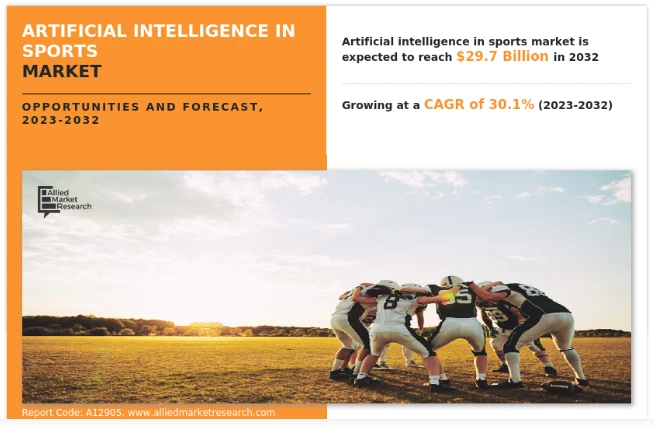
There is an increase in the shift for monitoring and tracking data of players. When it comes to chatbots & virtual assistants to engage with followers, they act as the driving element of the global artificial intelligence in sports market space. As you read above, what is the role of AI in sports, and how is it impacting the sports industry? Now it’s time to know some market data as well.
Key Market Data
- By deployment model of AI and sports, the cloud segment is estimated to have the highest growth during the current period.
- By region, the Asia-Pacific is expected to have the highest growth during the period.
Market Size & Forecast
- The sports artificial intelligence market is changing.
- The Estimated Market Size in 2023 is USD 29.7 Billion
- The Annual Growth Rate (CAGR) (2023-2032): 30.1%
“The future of AI is not about replacing humans, it’s about augmenting human capabilities.” – Sundar Pichai, CEO of Google
Role of AI in Sports and How it is Changing the Sports World in Different Dynamics?
- Artificial Intelligence (AI) is changing the sports world across various dynamics because it helps in enhancing players’ performance, fan engagement, and management.
- When it comes to players’ performance, AI analyzes biometric information to improve training, prevent injuries, and customize recovery programs.
- AI has vast datasets to optimize sports and game data and the player selection process. With the help of AI, even teams can use machine learning to check opponents’ patterns and create game plans to improve decision-making both on and off the field.
- With this role of AI, even the fan experience is changing. It is like they enjoy more fun content created by AI technology instead of just playing normally.
- Overall, AI is not just a technology; it is a technological change because it changes the dynamics of how sports are played and managed in different spaces.
- Its dynamic role continues to rise because of pushing the boundaries of player potential and fan engagement
Explore More: How Much Does It Cost To Develop A Fantasy Sports App?
What is the Use of AI in Sports Apps?
The usage of AI in sports apps is changing the digital sports era. From fantasy leagues to training apps, AI plays a vital role. Just to let you know, AI for sports applications is helping tennis and ping pong players (e.g., ping pong AI) improve reflexes and timing.
Apps like Sportspicker AI use algorithms to analyze massive datasets to help with sports betting predictions, a use case combining AI and sports betting with real-time analytics.
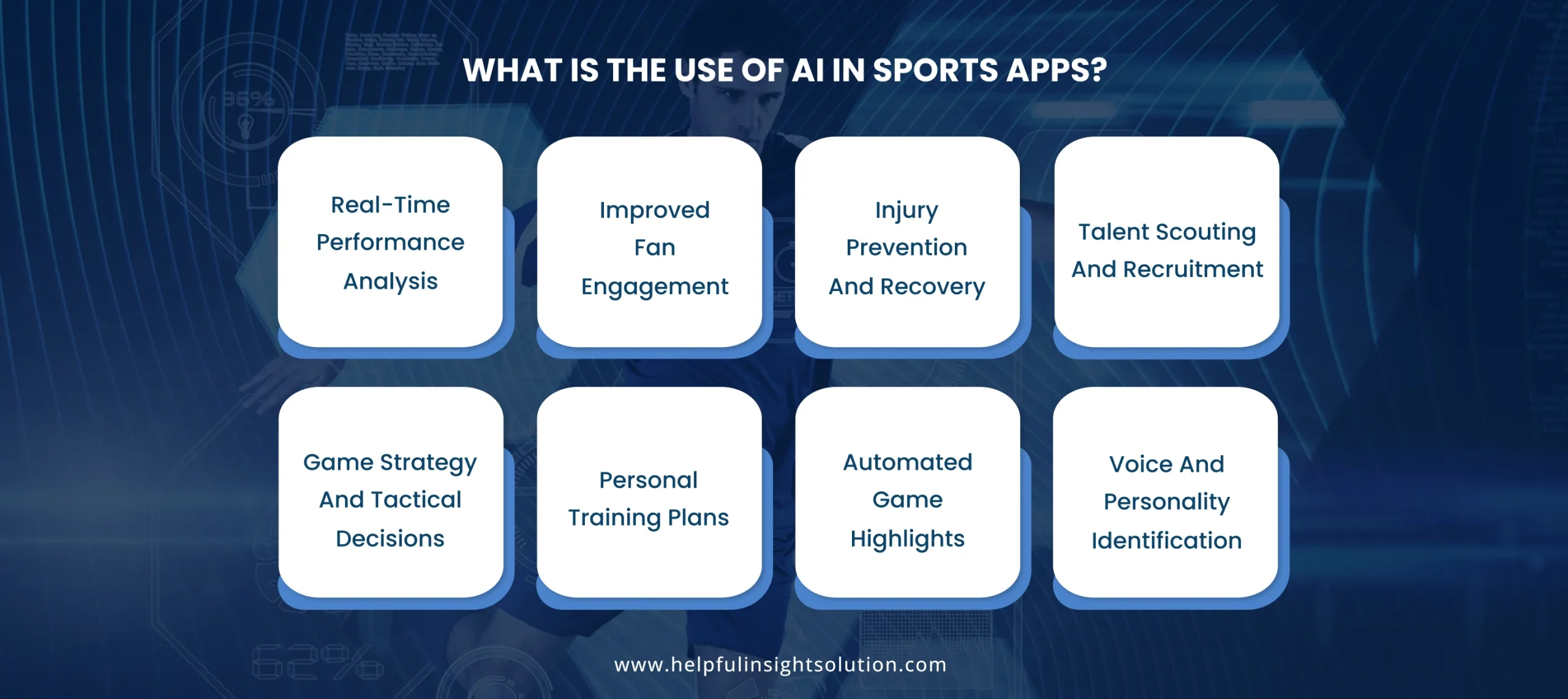
1. Real-Time Performance Analysis
Artificial intelligence can analyze real-time data from matches or training sessions. It gives feedback to players and coaches. Through video analysis and sensor data, AI can check mistakes and suggest things.
2. Improved Fan Engagement
AI in sports helps in creating fan experiences by checking preferences and providing the right content, such as highlights, interviews, or match previews. AI chatbots can provide real-time updates, player statistics, etc. It makes fans feel connected to their teams as it builds trust and boosts engagement.
3. Injury Prevention and Recovery
AI in sports helps in monitoring players’ physical condition by identifying data from wearables like heart rate monitors or GPS devices. It can also check movement patterns and examine potential injury risks based on the fatigue or stress levels of a person. For example, personal recovery routines are suggested to help players come back to their actual performance even faster.
4. Talent Scouting and Recruitment
AI in sports analysis helps sports teams and scouts analyze player performance data over time, looking for improvements. By using algorithms to process large datasets, AI can check consistent players, even from lower leagues or small markets.
5. Game Strategy and Tactical Decisions
AI uses historical game data and player statistics to assist teams in creating more reliable and authentic strategies. By checking trends in how opponents play or analyzing their actions. AI in sports can suggest strategic adjustments during games.
6. Personal Training Plans
AI sports apps can generate custom training programs based on a player’s actual skill level, fitness goals, and physical limitations. By refining the intensity and type of exercises based on progress, players can be trained effectively.
7. Automated Game Highlights
AI for sports can make game highlight reels by examining key things, like goals or turnovers. By properly checking camera angles, player movement, and crowd reactions, AI can create professional-quality content for fans who didn’t go to the live event. It can provide them with a personal viewing experience and make them feel more connected.
8. Voice and Personality Identification
AI-driven voice assistants allow players and coaches to chat with apps hands-free during games or events. Personality-identifying apps also check the player’s body movements. It can help in creating skills like shooting, dribbling, or serving, and more.
Extra information: You can even reach out to a mobile app development company like Helpful Insight to develop your AI-powered apps in a significant manner.
Implications of AI in Sports and Equipment
The significant role of AI in sports in creating a difference is not just a strategy but a massive tool. Smart equipment like AI-driven baseball bats, soccer balls, and wearables enhances precision and safety. In soccer AI, AI has the power to check ball spin, player fatigue, and sprint velocity.
For example, artificial intelligence in basketball apps is powering smart backboards that check shooting angles and players’ posture in a great manner. In the MLB, MLB AI systems help in pitch prediction of the players and injury prevention with the help of motion tracking tools. AI has played a major part in creating novel sports like Speedgate sport, which was developed through neural networks trained on existing sports regulations and movements.
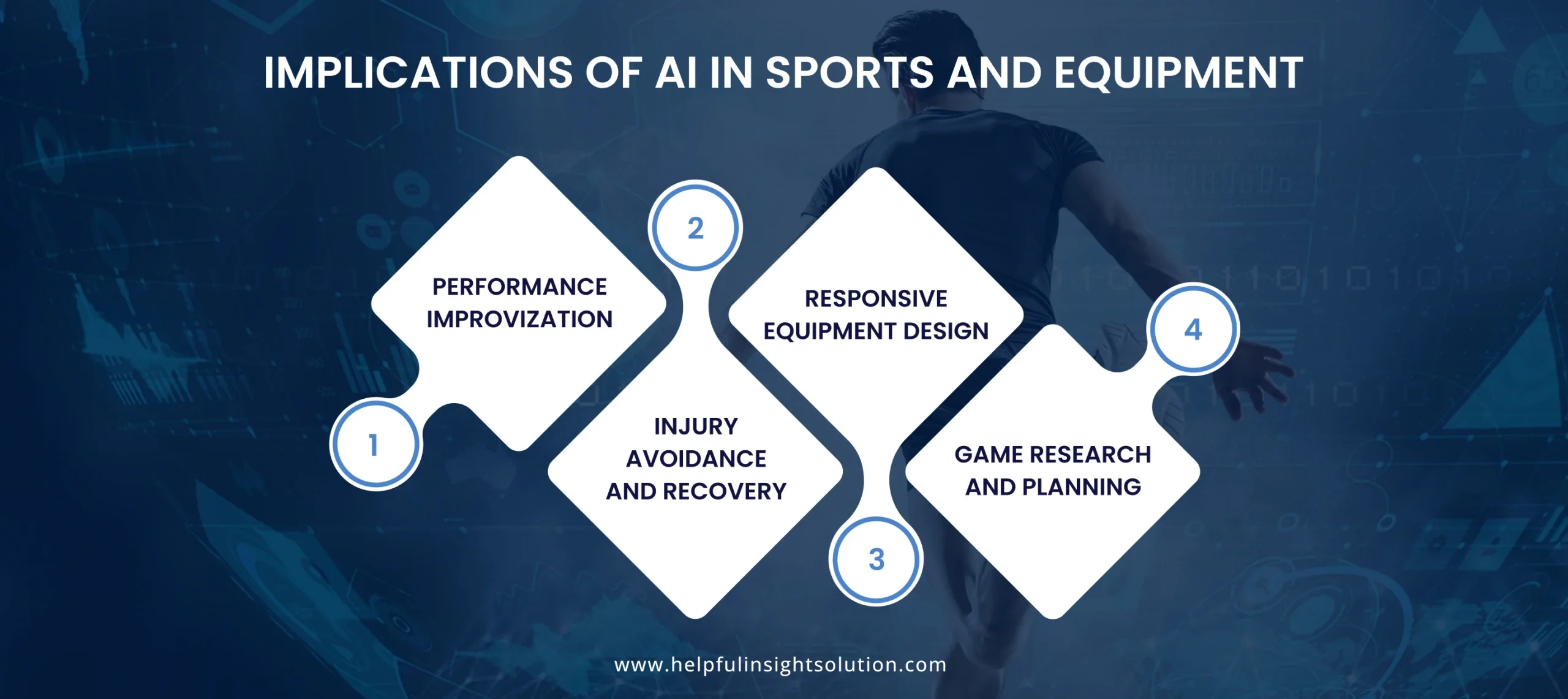
1. Performance Improvement
In the sports app, there is a feature Ai in sports analytics performance tracker that checks player data such as biomechanics, motion tracking, and fatigue levels in order to optimize training programs.
2. Injury Avoidance and Recovery
AI uses data from wearables and video analysis to see movement patterns that may lead to injury. It can predict risks and provide preventive measures. AI in sports apps provides personal recovery plans and monitors progress to ensure faster and safer returns.
3. Responsive Equipment Design
AI helps in designing creative sports gear by balancing usage conditions and identifying materials for performance and durability. For example, AI-designed shoes or rackets can identify player comfort and outcome.
4. Game Research and Planning
AI in sports industry needs an app to process vast data from past games to open up patterns and opponent weaknesses. There are algorithms of artificial intelligence that are vital for team analysis. It gives various options, like researching the opponent, which will lead to evolving tactics by teams.
Explore More: How Fantasy Football Apps Make Money? Monetization Models and More
Several Highlights of the Positive Impact of AI in Sports Industry
The benefits of AI in sports are mentioned below. So check the pointers below:
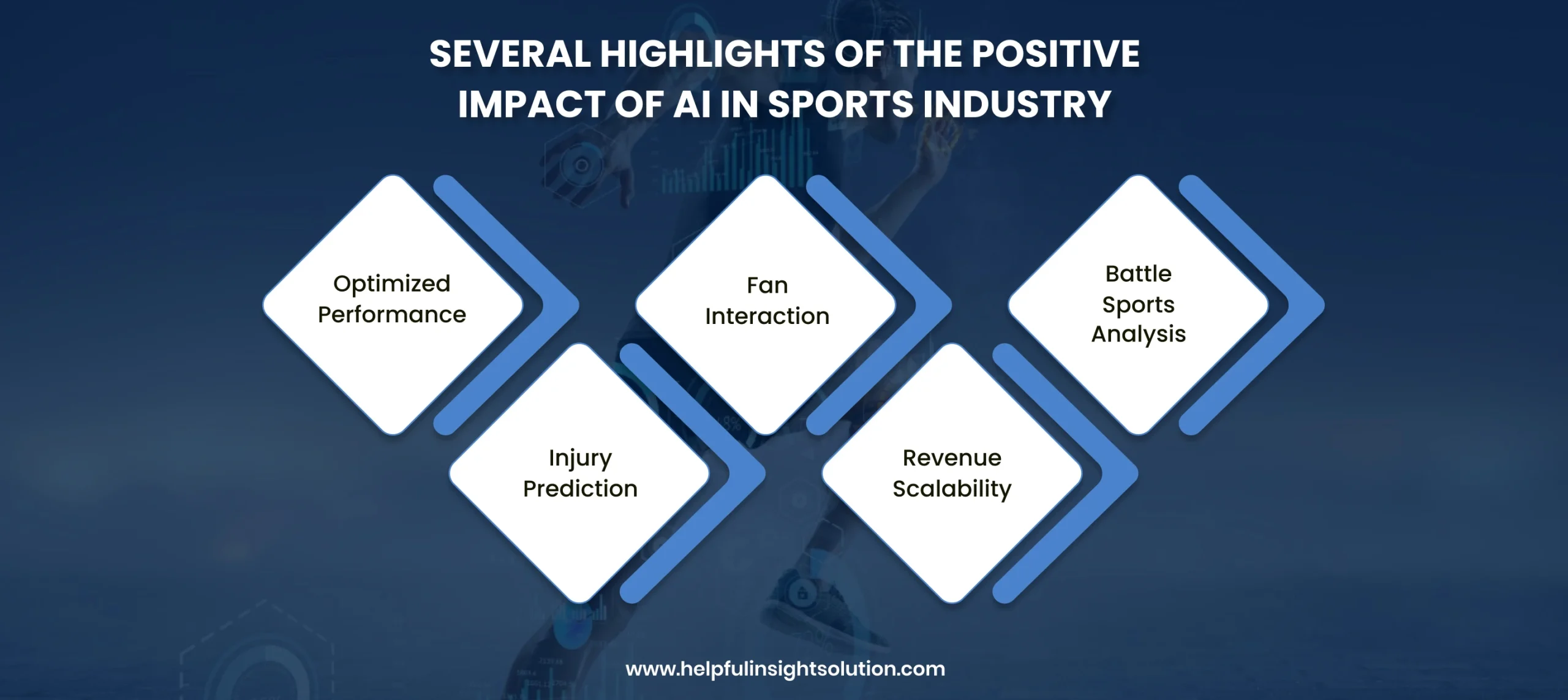
1. Optimized Performance:
AI uses player performance information in real-time that can assist coaches in checking individual needs for the game. It identifies inefficiencies or mistakes in movement, strategy, or technique to enable a smooth experience.
2. Injury Prediction:
While using wearable sensors and historical information, AI in sports applications predicts injury risks by identifying fatigue patterns and biomechanical stress. It alerts players and coaches before any injury occurs.
3. Fan Interaction:
Artificial intelligence delivers personalized content such as player highlights, suggestions, and fun experiences based on fan behavior and preferences. Chatbots, AR features, and real-time stats make fans connected to their team or sport.
4. Revenue Scalability:
AI structures ticket pricing, advertising, and sponsorship strategies by analyzing consumer behavior and market trends. It will help in examining new monetization opportunities and streamlining operations in the future. Also, to maximize your revenue, you can take help from the AI development services of a reputable company so that scalability and profits can be increased.
5. Battle Sports Analysis:
In boxing and MMA apps, AI gives options to assess opponents’ fighting styles, weaknesses, and patterns using video and sensor data features. Even in high-energy sports like boxing, AI models check opponent patterns and movements and suggest counterstrategies to reduce dependence on guesswork.
How is AI Changing the Fan Engagement Space?
One of the most attractive uses of AI and sports is changing how fans experience them.
AI models create highlights based on viewer preference and predict game outcomes. In the AI space, virtual assistants provide real-time commentary, while AI chatbots provide customer support and ticketing information to users.
In the NBA artificial intelligence era, franchises use AI to create content and run sentiment analysis on social media to balance fan reactions. Teams, for example, the LA Clippers, have used AI in this sport for dynamic pricing and in-stadium experiences.
Platforms that use AI in sports analytics are driving engagement by providing behind-the-scenes data stories, heat maps, and visualizations of player performance in real time.

What are the Best Examples of AI in Sports?
There are various examples of sports artificial intelligence that present how it’s applied practically:
- Soccer AI: Manchester City implements AI for tracking player data and predictive modeling.
- Slalom AI: There are skiing teams in Slalom AI apps that deploy AI to assess slope conditions and skier form.
- MLB AI: Teams can utilize AI for strike zone analysis and pitch-choosing optimization.
- AI in NBA: Coaches use AI to simulate player combinations and test game outcomes.
- AI in sports training: These apps and devices offer biometric feedback to athletes to refine routines.
These examples reflect the tangible influence AI has across leagues and individual sports. Even niche-specific applications like AI in sports examples are gaining visibility in creating reports and white papers.
Go to Steps Required for Integrating AI in Sports
Using AI in sports industry operations needs a strategic and proper approach. Given below are the pointers stated.
- Define Objectives: Decide whether the goal is to enhance performance, fan engagement, or operations. It is a foremost step that tells how AI can help in identifying what an app wants to create.
- Gather Data: Gather structured and unstructured data from sensors, matches, and player logs. It is a combination of everything an app wants from the users in terms of their match stats or their personal information. You can even do that by hiring app developers in Australia.
- Develop Algorithms: While developing a sports app AI uses machine learning or deep learning models specific to certain needs. It is a third step that can make the app usable and reliable.
- Install Infrastructure: There are cloud platforms and edge computing power for AI’s scalability. It is a backend infrastructure that acts as a user base to function in the competitive market and succeed in the future.
- Monitoring and Improvement: With the help of AI, you can continuously train models based on updated data for better accuracy. AI development companies can help you with this integration process as well.

Sports App Development Diversified: How Helpful Insight Can Help You
As the sports apps industry emerges, development is no longer about general scoring and news; it’s about AI in sports analytics, interactivity, and real-time personalization to have a fun experience. The expansion of artificial intelligence in the ports market is unstoppable, especially as startups, universities, and leagues collaborate to innovate.
AI brings vision to app development by:
For sports startups, using artificial intelligence in the sports industry means implementing predictive tools, tracking metrics, and providing engaging fan features.
- Suggestions/ Recommendations, such as content based on the user’s behavior.
- Giving predictions based on user actions for proactive engagement
- Improves ad placement and provides a scope to apply different monetization options.
- AI can help in Structuring UI/UX designs with behavior analytics.
- With these aspects, businesses are more likely to invest in AI development services to develop their sports apps in a better way.
The role of AI in sports is growing fast. From performance training and fan engagement to market growth and app development, AI is a major part of modern sports evolution. For sports startups, using artificial intelligence in the sports industry means implementing predictive tools, tracking metrics, and providing engaging fan features.
Whether you’re a player, coach, developer, or sports executive, understanding and applying AI is no longer optional; it’s an essential part to move ahead for future success in the game. Also, with the help of our fantasy sports app development services, you have the option to develop AI fantasy sports apps. So let’s not wait and achieve something good.
FAQs
AI systems check physiological data (like heart rate variability, sleep cycles, and recovery metrics) with training load and emotional chaos from wearable tech or even video interviews. Different predictive models can remove early signs of overtraining and mental fatigue.
Yes. AI-driven simulators and VR environments now function for opponent behaviors based on match data. These “digital twins” duplicate specific athletes’ styles, decision-making patterns, and weaknesses. It provides targeted practice scenarios with a high amount of fidelity.
AI tools now identify video footage from obscure or non-professional leagues using computer vision to assess player performance metrics like sprint speed and pass accuracy. This balances the playing field by helping scouts to find the right person despite geography or lack of revelation.
Partially, it can be yes. AI-powered automated cameras can handle live coverage in games like soccer, basketball, and ice hockey at beginner levels. They can track games without human involvement and can reduce costs.
AI is impacting official sports like tennis (Hawk-Eye), soccer (VAR), and cricket (DRS). However, there’s a conversation about the honesty of AI decisions. There are different leagues that are experimenting with AI-hybrid referees, humans guided by AI rather than full automation.





